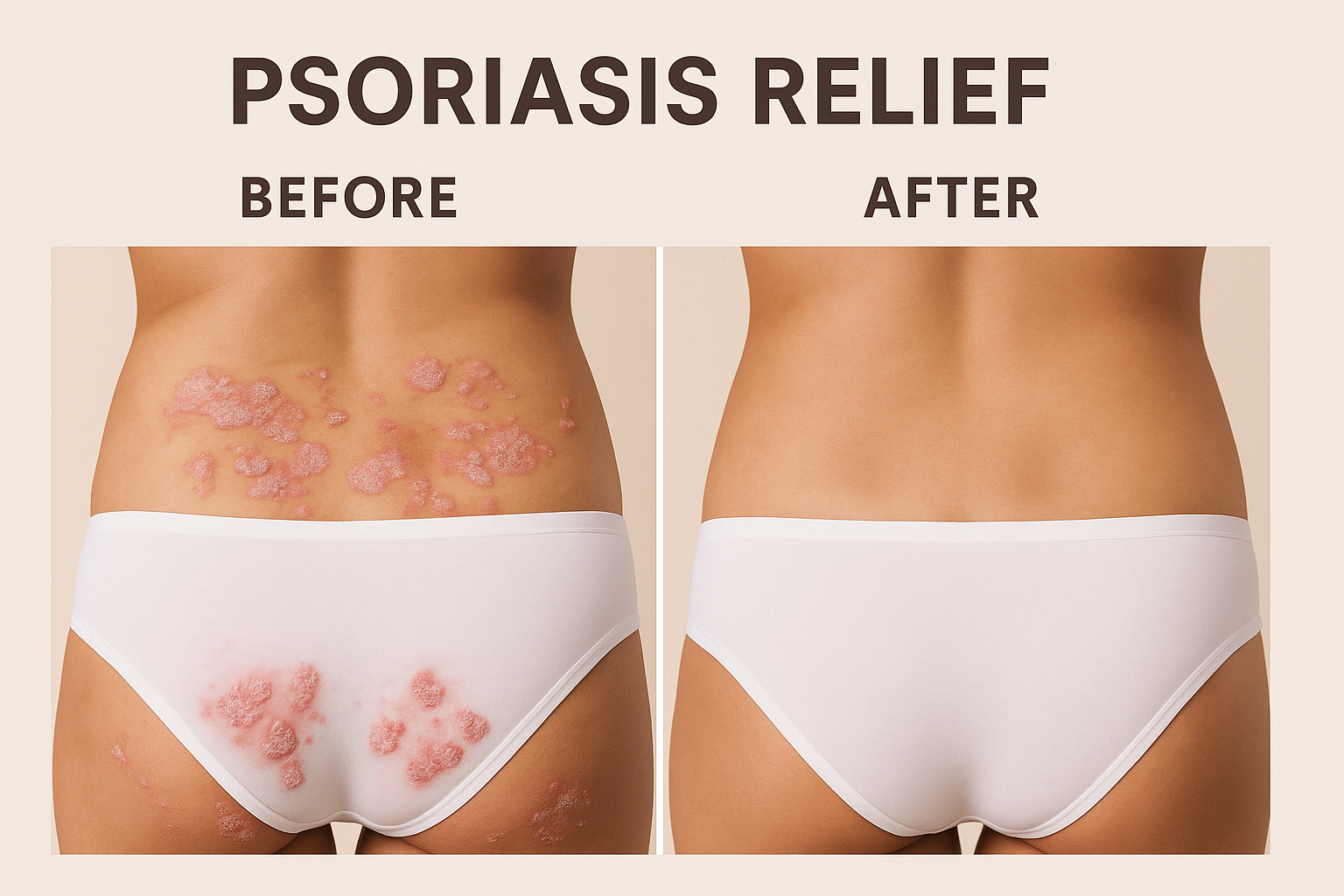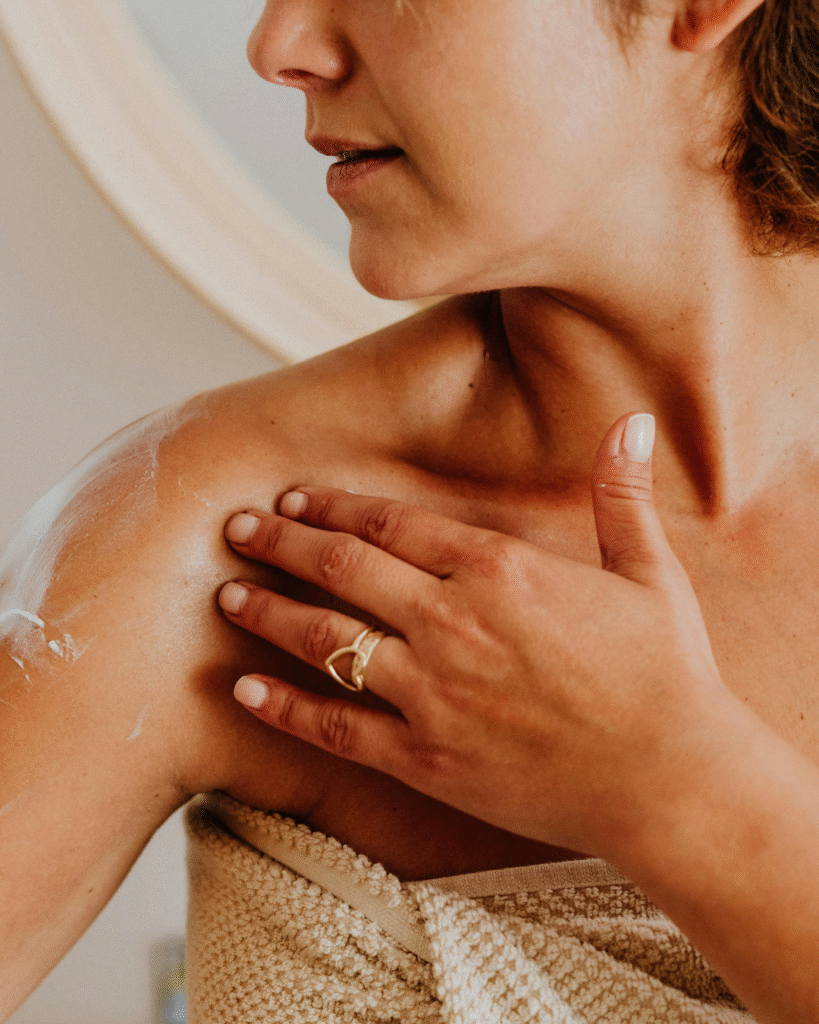Physical Address
304 North Cardinal St.
Dorchester Center, MA 02124
Physical Address
304 North Cardinal St.
Dorchester Center, MA 02124


Please note: This post about Psoriasis Relief may contain affiliate links. As an Amazon Associate, I earn from qualifying purchases, which helps support this blog at no extra cost. I only recommend products I genuinely believe in!
Read “Psoriasis on Buttocks: A Comprehensive Guide“
Living with psoriasis can feel like a never-ending loop—itching, flaking, dryness, discomfort. It’s more than just skin deep. Psoriasis is an autoimmune skin condition that causes rapid skin cell turnover, leading to red patches and itchy skin.
If you’re here, it probably means you’re looking for psoriasis relief, maybe even some hope. And you’re in good company. Millions manage psoriasis every day—and with the right tools, you can too.
This article is your cozy corner for discovering over-the-counter psoriasis treatment products that many have found helpful. Think of me as your skin-care-savvy friend, sharing go-to remedies and soothing tips.
Of course, this isn’t a substitute for medical advice. If your psoriasis is severe or spreading, a dermatologist is always your best bet.
What Is Psoriasis?
Imagine your skin is on a natural rhythm. Normally, cells grow and shed in a cycle that takes weeks. But in psoriasis, that rhythm hits fast-forward. Cells multiply too quickly, piling up on the surface in red, scaly patches. This process is a hallmark of autoimmune skin conditions.
This acceleration in skin cell turnover creates inflammation, itchy skin, and visible plaques. It’s not contagious, but it is persistent and often influenced by internal and external factors.
Common Symptoms You Might Notice
You might feel an itch that just won’t quit. Or notice flaky skin and silvery scales, especially on elbows, knees, and scalp. Some areas might crack or sting. It’s a chronic condition, and symptoms can vary widely from mild to severe.
Other symptoms may include dry skin that bleeds, thickened or pitted nails, or joint stiffness if psoriatic arthritis is involved. These are all signs that managing psoriasis flare ups should be part of your everyday wellness plan.
Why Topical Products Matter
Topicals are your front-line defense. They work right where the problem is—on the skin’s surface. From soothing itchy patches to softening stubborn scales, these products bring targeted relief.
Let’s dive into the star ingredients you’ll want on your shelf when building your psoriasis moisturizing routine.
Salicylic Acid: The Gentle Exfoliator
Salicylic acid is like a polite guest who quietly lifts away flaky skin without making a fuss. It softens scales, making it easier for other treatments to work. It also improves skin texture by dissolving the bonds between dead skin cells.
Look for lightweight, non-irritating creams that blend salicylic acid with moisturizers. These are considered among the best creams for psoriasis by many users.
Coal tar has stood the test of time. It slows down rapid skin cell growth and calms itching. It may not have the prettiest smell, but its effects speak volumes. It also reduces scaling, dryness, and inflammation.
You’ll find coal tar in thick ointments, bath solutions, and shampoos. A popular choice is a therapeutic ointment with 2% coal tar—perfect for elbows, knees, and stubborn plaques.
Hydrocortisone: Your Itch-Relief Buddy
This low-strength topical corticosteroid is a lifesaver during flare-ups. It helps reduce redness, swelling, and that relentless itch. It mimics cortisol, a hormone your body produces to reduce inflammation.
Keep a travel-sized hydrocortisone lotion or cream in your bag for quick, calming relief on the go. It’s best used for short durations and in small areas unless advised by a doctor.
Urea sounds clinical but feels like a hug for dry, cracked skin. It attracts water and helps soften thickened skin, making other treatments more effective. At higher concentrations, it can even have a mild exfoliating effect.
Look for products that combine urea with salicylic acid or ceramides for a double-duty moisture boost. These are ideal when you wonder what helps psoriasis dry skin in colder or drier climates.
Moisturizers: Your Daily Hydration Hero
Hydration isn’t optional—it’s essential. A rich, fragrance-free moisturizer locks in moisture and reinforces your skin’s barrier. Ingredients like shea butter, glycerin, and ceramides are your allies.
Apply a thick, non-greasy cream designed for sensitive skin and psoriasis after every bath or shower. This is the cornerstone of a gentle skincare for psoriasis relief.
Scalp Psoriasis and How to Soothe It
When flakes fall like snow, it’s more than a nuisance—it’s uncomfortable and sometimes embarrassing. The scalp is one of the most commonly affected areas.
Use a scalp psoriasis shampoo that contains coal tar or salicylic acid, followed by a gentle, non-stripping conditioner. Massaging the scalp gently during application can help dislodge scales.
Medicated Shampoos That Help
These shampoos target inflammation and help exfoliate dead skin. Avoid using regular dandruff shampoo unless it specifically lists these active ingredients. Lather, leave on for at least five minutes, then rinse thoroughly.
Facial and Sensitive Area Care
Areas like the face, eyelids, and skin folds are more delicate. Go slow and always test first. Use the mildest products possible.
Seek out fragrance-free creams with ceramides or aloe. For inflamed areas, a very low-dose hydrocortisone cream might be appropriate (but only with your dermatologist’s okay).
Dead Sea Salt Baths: Calm in a Tub
Dead Sea salts are mineral-rich and known to ease inflammation and loosen scales. It’s like turning your bathtub into a mini spa.
Add a few scoops of dead sea salt for psoriasis to a warm (not hot) bath and soak for 15–20 minutes. Rinse, pat dry, and follow with a thick moisturizer.
Oatmeal Products: Nature’s Comfort Blanket
Colloidal oatmeal is like a gentle whisper to your irritated skin. It calms, soothes, and moisturizes without harshness. Perfect for flare-ups or itchy nights and one of the best natural remedies for psoriasis itch.
Try an oatmeal bath soak or a lotion for sensitive skin enriched with colloidal oats.
Gentle Cleansers: Wash Without Worry
Soap can strip your skin. Look instead for hydrating cleansers that clean without causing more dryness. These often come with skin-repairing ingredients like ceramides, niacinamide, and salicylic acid.
A psoriasis-friendly cleanser with a mild exfoliating ingredient can cleanse and calm without irritation. Avoid foaming formulas with sulfates.
Consistency Is Key
Apply your topicals daily. Even when your skin looks better. Psoriasis isn’t a sprint—it’s a marathon. This is especially true when maintaining your psoriasis treatment at home.
Patch Test New Products
New isn’t always better. Always test a dab of product on a small spot first. Wait 24 hours before going all in. This helps avoid surprises.
Lock in Post-Shower Moisture
Within five minutes of showering, apply your cream. That’s your golden hydration window. Moisture is absorbed better when skin is slightly damp.
Know Your Triggers
Everyone’s different. For some, it’s stress. For others, it might be certain foods, weather, or soaps. Keeping a skin journal can be eye-opening and empowering.
A Bit of Sunshine
Natural sunlight (just a little!) can help calm psoriasis. UVB rays can slow skin cell growth. But never overdo it—burns make things worse. Always balance exposure with sun protection.
De-Stress for Your Skin’s Sake
Stress and psoriasis? Not friends. Whether it’s breathing exercises, music, or long walks—find what calms your mind. Yoga and guided meditation apps can also help.
When to Call a Dermatologist
If your patches are spreading, painful, or just not improving, a dermatologist can offer stronger treatments—from prescription creams to light therapy or biologics. Don’t hesitate to get expert support.

There’s no magic cure—but there is consistent psoriasis relief. The right mix of OTC products, good habits, and skin-friendly care can help you feel better in your skin.
Explore over the counter psoriasis treatment options like salicylic acid creams, soothing tar shampoos, rich moisturizers, and calming soaks. Try, test, and learn what works best for your body.
Take this guide as your starting point—and take back control of your comfort. Here’s to skin that feels good, looks healthy, and lets you live freely.
Ready to start your soothing routine? Explore the product types mentioned above and see what fits your skin’s needs. Stick with it, be gentle with yourself, and celebrate every bit of progress.
Psoriasis on the buttocks can be especially frustrating. The constant friction from clothing, sweating, and prolonged sitting can worsen irritation. It often shows up as flat, red, itchy patches—sometimes mistaken for a rash or fungal infection.
Here’s is your Psoriasis Relief solution for it with comfort and confidence:
As always, if irritation worsens or doesn’t improve, a dermatologist can help with stronger treatments. Don’t let location discourage care—your comfort matters everywhere.